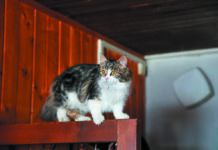Most of us have stories of pushy cats who jump onto tables and countertops demanding our food or slyly making their way over to dishes that are not meant for them. Should the behavior be discouraged?
The answer depends, in part, on whether it annoys you. It also depends on whether feeding table scraps is such a consistent habit in your household that it crowds out too many calories from the complete and balanced cat food you put in your pet’s bowl.
We’ll leave it to you to decide if your cat’s hankering for people food is acceptable. On the nutrition side, there’s nothing intrinsically wrong with letting your pet have a taste of your food here and there, especially if the food fits comfortably into good feline nutrition. Healthful options include lean beef and poultry, fish, and eggs. A tidbit of a fresh fruit or vegetable once in a while isn’t going to hurt, either.
That said, keep in mind that the average cat weighs somewhere between 8 and 10 pounds and requires around 250 calories a day. It doesn’t take much extra food for a cat to become overweight and end up with joint issues and other problems that interfere with mobility and overall health. A single ounce of lean chicken breast contains almost 50 calories.
Bear in mind, too, that there are certain foods that are dangerous for cats and should never pass their lips.
Onions, garlic, and chives. These items destroy a cat’s red blood cells and lead to a form of anemia. If your cat manages to score a lick of spaghetti sauce seasoned with onion or garlic, she’s not going to get sick. But you don’t want to let it become a regular habit.
Grapes and raisins. The good news here is that most felines don’t like grapes and raisins. But keep them out of reach regardless, because this is a case in which curiosity can do serious damage. Grapes and raisins cause feline kidney damage and sometimes even kidney failure.
Milk. Milk really is not a good idea for cats. They lack the enzyme that helps digest it, so it can cause bloating, gas, and diarrhea.
Avocados. Avocados are mildly toxic to cats and can cause vomiting and diarrhea. Keep the guacamole out of reach.
Chocolate. Even a small amount of chocolate can be toxic to cats, bringing on everything from hyperactivity to abnormal heart rhythm, seizures, and potentially, death.




